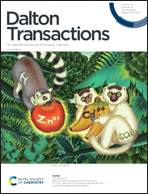Rational design of a Ru(ii) complex with a donor–acceptor–donor structure for organic resistive memory devices†
Abstract
A novel Ru(II) complex with a donor–acceptor–donor (D–A–D) ligand was designed and synthesized to prepare organic memory devices. The fabricated Ru(II) complex-based devices exhibited obvious bipolar resistance switching behavior with a low switching voltage (∼1.13 V) and a large ON/OFF ratio (105). The dominant switching mechanism can be explained by the distinct charge-transfer states endowed by the interaction between metals and ligands, which is verified by density functional theory (DFT) calculations. Excitingly, the device displays a much lower switching voltage than most of the previously reported metal complex based memory devices due to the intense intramolecular charge transfer caused by the strong built-in electric field in D–A systems. This work not only reveals the potential of the Ru(II) complex in resistive switching devices, but also provides new inspiration to manipulate the switching voltage at the molecular level.



 Please wait while we load your content...
Please wait while we load your content...